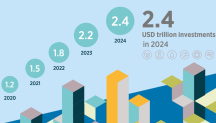

IRENA 14A: Pre-Assembly Live Coverage
Newsletter
Welcome to the Fourteenth session of IRENA Assembly Live. Follow this page for live blog from all sessions during the Pre-Assembly day and check IRENA social media channels for updates on #IRENA14A.
IRENA Pre-Assembly stakeholder and ministerial meetings are taking place on the 16th April 2024. See the full schedule here.
Youth Forum
The day commences with a Youth Forum session themed "Youth at the core of Just Energy Transition: Skills, Empowerment and Innovation". This session is dedicated to empowering young leaders to foster a just and inclusive energy transition. The session was opened by Lydia Sanz-Lozano, Student Energy Summit who welcomed the participants and encouraged them to bring home what learn here.
The session focuses on building skills and capacities in renewable energy among youth, amplifying their voices in energy discussions, and encouraging youth-led innovation for sustainability. The IRENA Deputy Director-General, Gauri Singh started the panel conversation saying "Each of you show passion and commitment. Let me congratulate you on your work in this space. Through this opportunity, we will learn from you and I encourage you to take every opportunity to work with communities and make changes happen. I would really encourage each of you here to work in the field, to work with communities, to understand what it takes to make change happen, and to build on the passion you have for climate change."
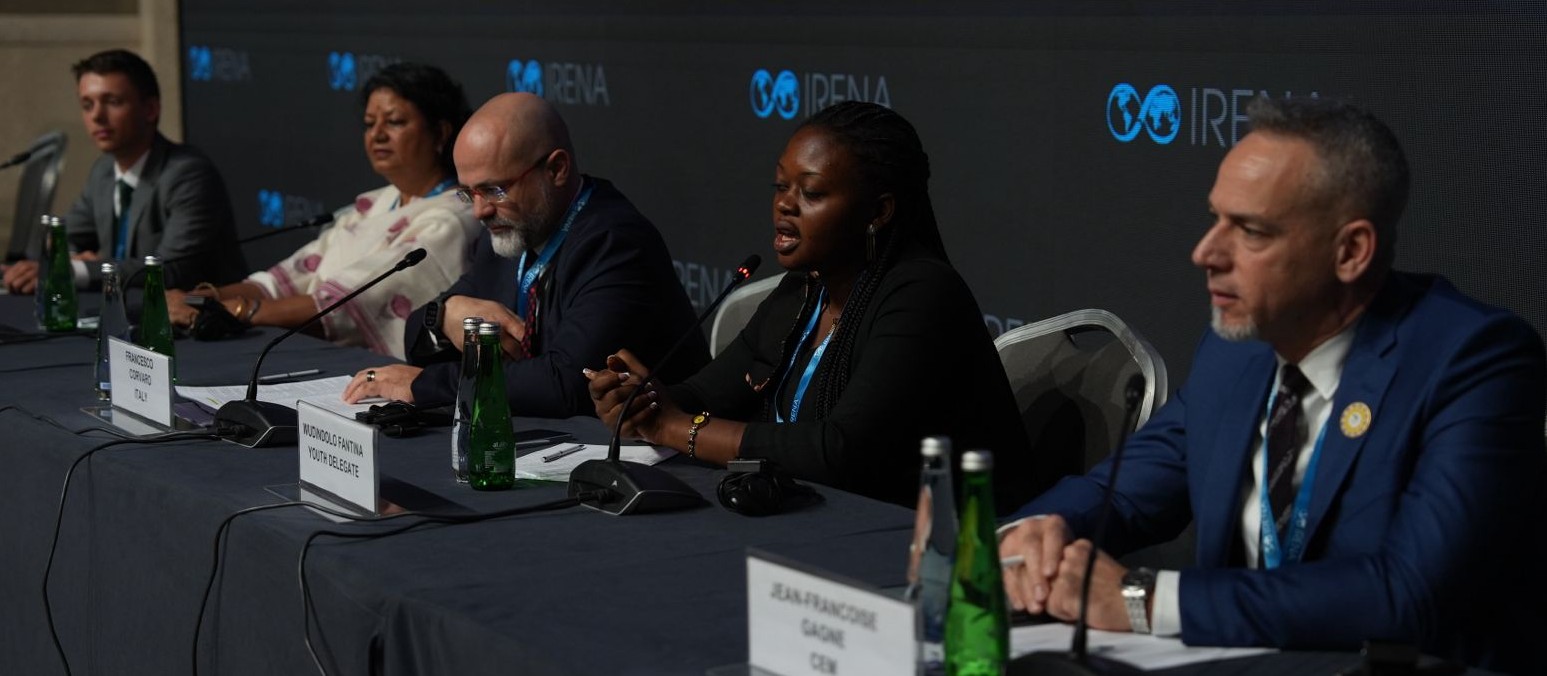
The discussion continues with the focus on challenges that the Youth faces in engaging on a global level. Gauri Singh, Deputy Director General, IRENA, shares the Agency’s focus on nurturing the next generation's skills and resources for climate leadership. “Whether you are deciding on academic paths or driving startup innovation, our accelerator program provides mentoring and networking opportunities to shape valuable solutions for climate change", she said.
The Forum is now opened for questions from the audience. Asked about her journey to leadership in the renewable energy sector to inspire young women in the sector, Wudindolo Fantina responded that belief in oneself is the starting point. "I make sure that I can have my voice heard. The keys are identifying your strength and persevere."
Jean Francoise Gagne, Head of the Clean Energy Ministerial Secretariat, urges the youth to unite in tackling the uncertainties of the future. “You can’t predict the future, but at the same time you can’t wait for the future to be happening on you. And that is why today is very important in helping to build the resilience that will propel us.”
Find out more about the Youth Forum here.
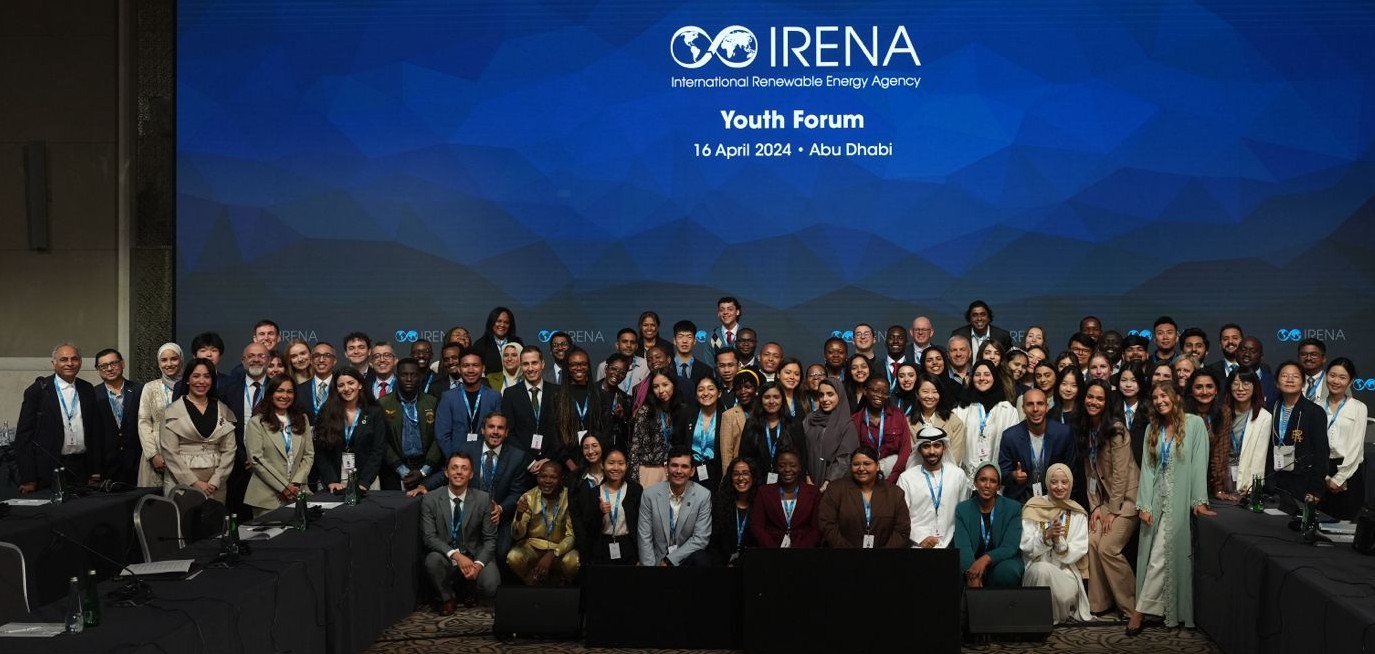
The panel discussion is now finished and the session progresses to its next segment focused on group work with the invited guests. The youth will engage with policy makers, government representatives, philanthropy and other stakeholders to discuss the role of youth in just energy transition. The suggested topics focus on identifying priority areas for action to accelerate skills development and youth empowerment post-IRENA Youth Forum and scaling-up Youth-led climate and energy initiatives.
Electrification of Road Transport Enabling Policies and Systemic Innovation
This Pre-Assembly session delves into the policies and innovations supporting the electrification of road transport, bringing together policymakers, experts, and industry leaders to discuss the transition to renewables-based electrification for various vehicle types. IRENA's Tracking COP28 Outcomes report shows that progress in transport electrification in 2023 fell short of the required pace. The current battery electric vehicle (BEV) and plug-in hybrid electric vehicle (PHEV) stock would need to increase from around 40 million today to 360 million by 2030, a target that cannot be achieved at current growth rates.
Jinlei Feng of IRENA delivered a scene-setting presentation, outlining the status of the road transport sector and its decarbonisation needs. Multiple barriers impede the transition, including high-upfront purchase costs, battery costs, charging infrastructure improvement needs and lack of supporting policies. The electrification of road transport requires systemic innovation, encompassing not only technology and infrastructure but also market design and business models.
The latest Innovation Landscape for smart electrification report highlights 35 innovations for mobility sector and provides an overview of blind spots for policy makers.
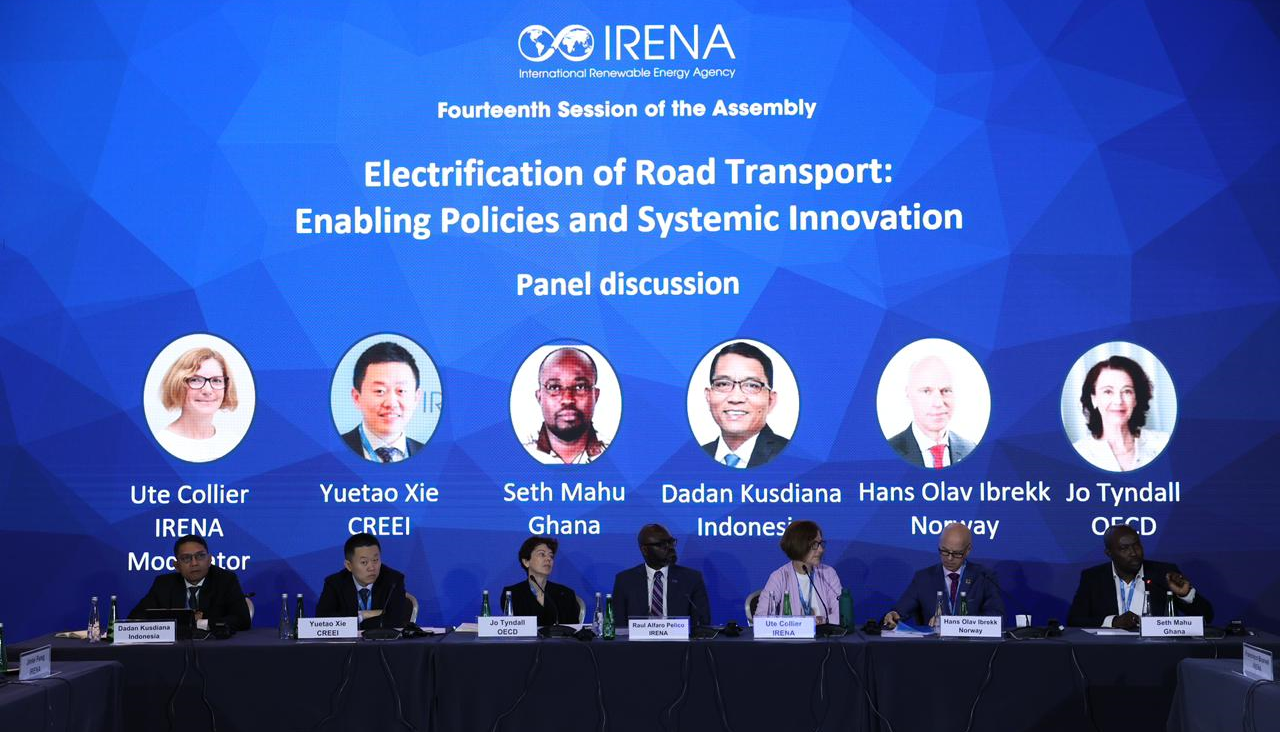
Norway represents a success story in e-vehicles introduction. The country leads on the amount of the electric passenger vehicles, with a share of around 95% of electric vehicles on the road. More than 82% of vehicles sold in Norway in 2023 were EVs and it will not be possible to purchase fossil fuel cars from 2025 in the country. Mr Hans Olav Ibrekk, Special Envoy on Climate and Security, Ministry of Foreign Affairs, Norway, said "We don't have a car producer in Norway. There is no industrial benefit to us." He continued discussing the incentives provided by the Norway government to support the road transport electrification and the impact of this positive change. "The huge benefit of the transition is that the noise level has gone significantly down", he concluded.
EV sales have also been rapidly increasing in China. Dr Yuetao Xie, Director, China Renewable Energy Engineering Institute National Energy Administration, China outlined that 9.5 million EVs were sold in 2023, accounting for 32% of total vehicle sales. China is the largest EV market in the world and charging infrastructure has been a significant Chinese policy priority, including substantial investment in public and private charging stations, especially those at highway service stations.
Jo Tyndall, OECD discussed the important role of facilitating active and public transport alongside measures to increase the electrification of private transport. She underlined that “Systemic innovation is needed. The current transport system is playing against us”.
In the ongoing discussion, various means of supporting and incentivising vehicle electrification were discussed. Panelists highlighted support means for vehicle adoption, such as incentives in parking policies and in the provision of subsidies or the incentivisation of charging during off-peak periods. It is clear that the investment in charging infrastructure and battery swapping facilities and increasing the flexibility of electric vehicle charging, via smart charging are key. The panelists also underlined that the coherent measures across the promotion of active and public transportation modes are also needed to manage overall energy demand from the sector.
The discussion culminated with the agreement that is is crucial to increase consumer confidence to drive e-vehicle adoption. The systemic innovation is key to addressing the range of challenges highlighted, and the opportunities identified.
IRENA/CEM – Progress & options for wider collaboration
The Members gather to discuss the ongoing partnership with IRENA, and Clean Energy Ministerial (CEM) initiatives, highlighting progress and exploring cooperation opportunities. The session seeks insights on enhancing international collaboration, integrating IRENA's contributions into CEM workstreams, finding common ground for greater impact, fostering collaboration to benefit Global South countries.
The IRENA-Clean Energy Ministerial (CEM) event opened with an introduction from the co-organisers, on the ongoing collaboration between the two organisations, and how today's discussion will explore more opportunities and synergies in the collaboration. Representing IRENA, Michael Taylor, Head Renewable Energy Costs and Outlook, acknowledged upcoming opportunities for collaboration, in tripling renewables capacity and doubling energy efficiency.
During the panel discussion, Peta Olesen, Director, Net Zero Innovation, Australia International Climate and Energy Division, Department of Climate Change, Energy, the Environment and Water, shared her government's views on the role of IRENA in the collaboration, "IRENA has demonstrated the particular role in bringing knowledge to the global scale, especially to reach out to developing countries, where support is most needed."
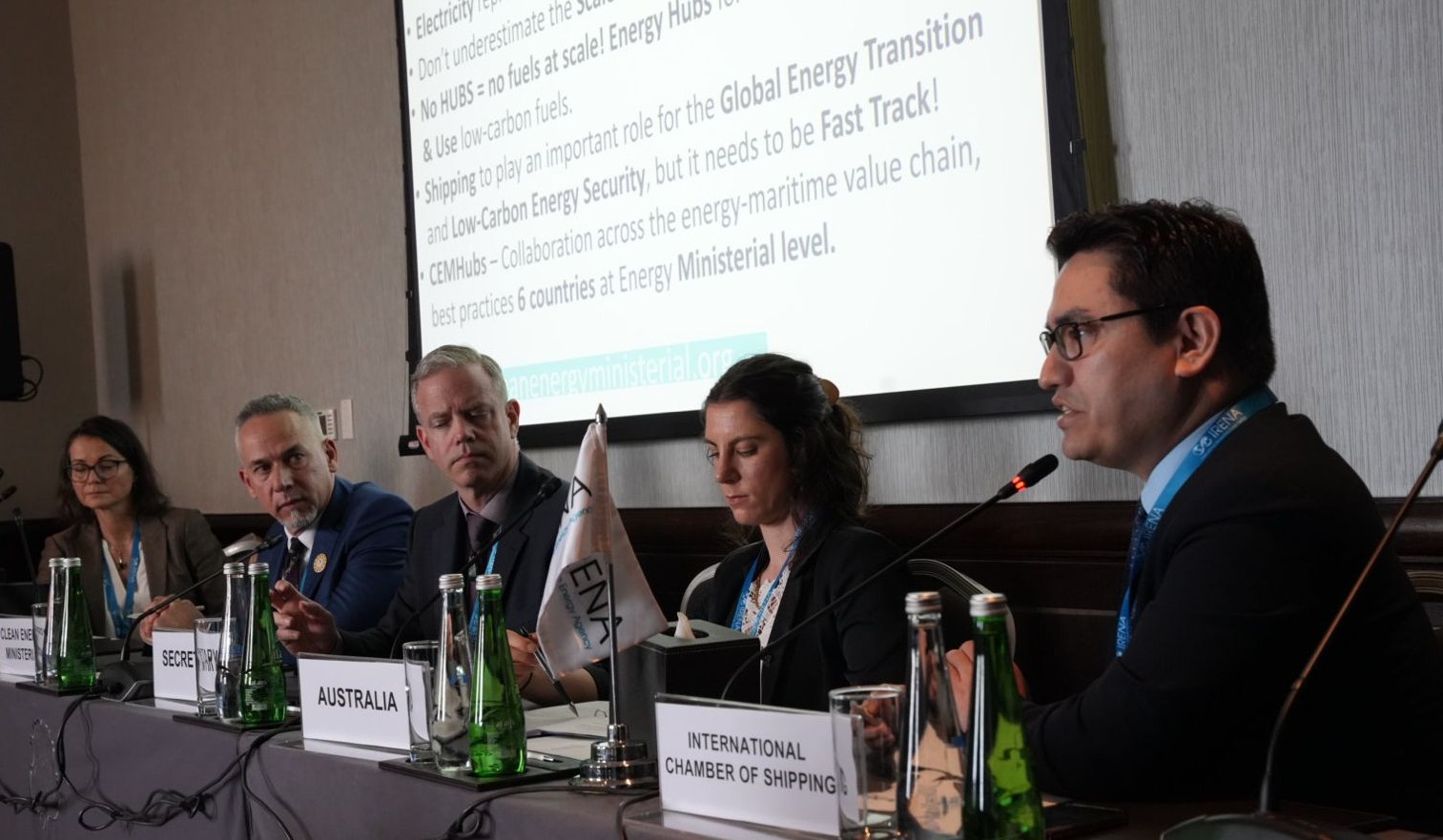
On identifying opportunities to bring in different voices, Sandra Dickison, Deputy Director, Office of Multilateral Climate and Clean Energy Engagement | Office of International Affairs, U.S. Department of Energy, said, “Enticing cooperation is always an important part of the discussion. We need to bring in voices from other countries and places, and that’s where I see the value of cooperating with IRENA.” Sandra Dickison, Deputy Director, Office of Multilateral Climate and Clean Energy Engagement, Office of International Affairs, U.S. Department of Energy noted that "IRENA has the analysis, the global membership and outreach to make sure efforts are scaled up."
Concluding the session, speakers agreed that without implementation, goals lead to nothing. IRENA and CEM have been valuable in bringing initiatives to implementation through their respective unique strengths.
IRENA 2024 Legislators Forum
This year's Forum is held under a theme "Building Blocks for a Renewable Future: Accelerating Progress Towards the COP28 Pledge." The forum is a crucial platform for global legislators to discuss advancing renewable energy within their regions, considering the urgent climate action needed and the ambitious COP28 pledge to triple global renewable energy by 2030.
The interventions continue. Meera Sultan AlSuwaidi, Member, Federal National Council, United Arab Emirates, says that the UAE Consensus adopted at COP28 is guiding the country’s path towards a sustainable future. “Despite being an oil-rich country, we understand the importance of diversification and conservation, especially with record-breaking temperatures. But to achieve our commitment at COP28 through the UAE Consensus, we must expedite the transition to renewable energy, address climate finance and prioritise community well-being. Inclusivity is key; no one should be left behind.”
In her intervention, Jacqueline Amongin, Uganda’s Member of Parliament, says that access to electricity in Uganda still stands at 40%, which creates opportunities for renewable energy development to boost access. “Electricity access in Uganda is not sufficient enough to fast-track economic development. With overall access standing at 40%, there is room for wind and solar projects, and this is the direction we are taking as part of our renewable energy vision for 2040. Renewable energy adoption is expected to uplift communities and open up opportunities especially for the youth and women.”
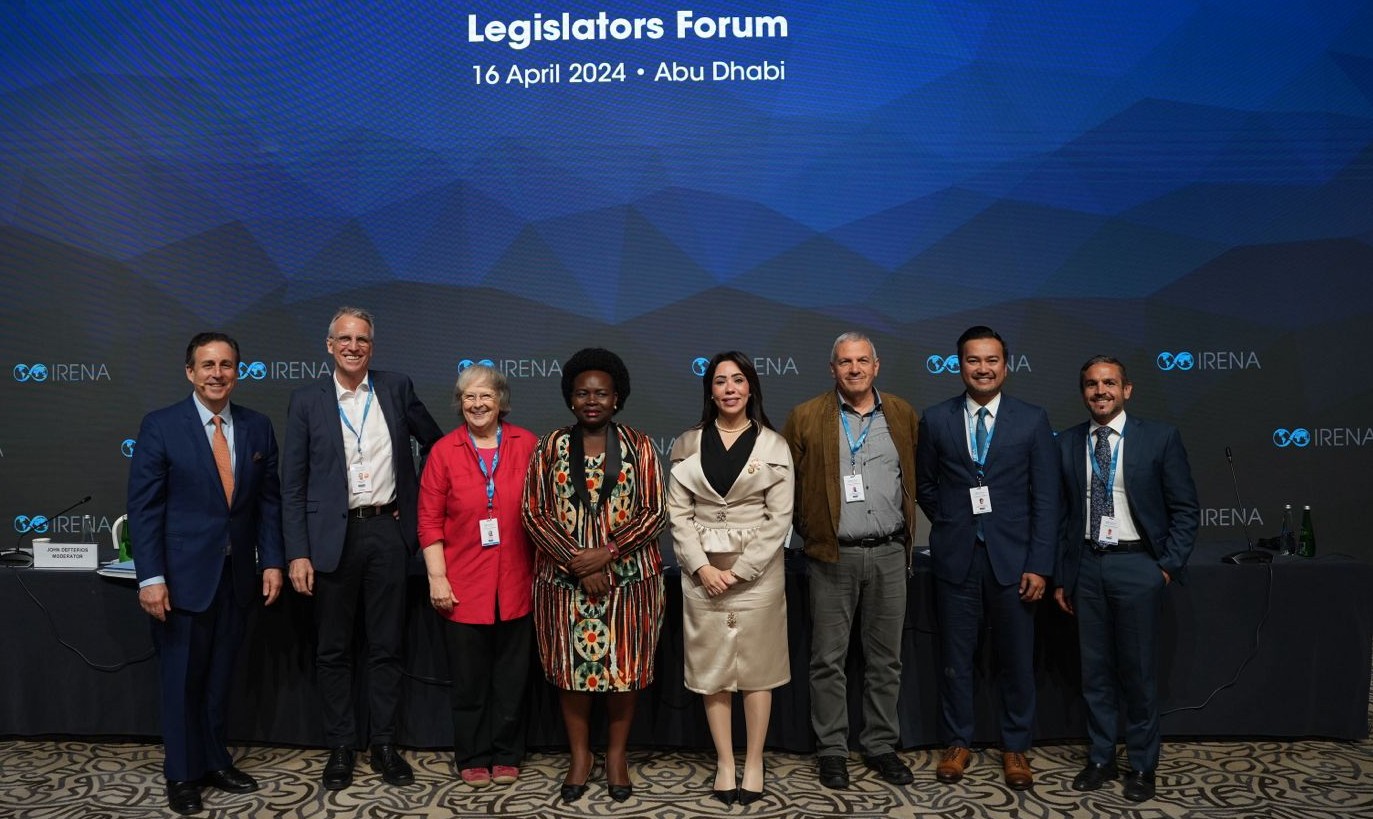
Session ends with a call for technology transfer from the global north to the global south to accelerate the energy transition, and the urgent need to reduce dependence on fossil fuels by scaling up renewable energy investments. Panelists further call for enhancement of universal access to electricity as one of the best ways to empower women and youth in developing countries. Parliamentarians are urged to play a crucial role in driving political will, streamlining bureaucracy, creating an enabling investment climate, and building the necessary human capacity to facilitate the energy transition.
Harvesting Synergies: The Water-Food-Energy Nexus for Enhanced NDCs
This session focuses on the crucial connections between water, food, and energy systems, emphasising the need for a transformative approach to sustainability and climate commitments. The discussion seeks to motivate stakeholders across different sectors to exchange strategies and innovations in sustainable agriculture, emphasising the use of renewable energy.
Ms Maria Michela Morese, Energy Team Leader and Senior Natural Resources Officer, FAO has underlined that the growing population, urbanization, and fast economic development are among the economic developments that are driving an increased demand for water, energy and food. Agriculture is the largest consumer of the world's freshwater resources and agri-food systems are responsible for about 30% of the world's total energy consumption. "Global population expected to reach 10 billion people by 2050 will require a 60 percent increase in food production. We need a holistic approach to address the Nexus by prioritizing investments in building resilient agrifood systems, reducing disaster risks, and employing community-based approaches", she concluded.
The World Future Energy Summit has also opened in Abu Dhabi today.
Enjoyed opening the @IRENA pavilion at #WFES2024 & address business leaders. Their full engagement is crucial in navigating the global #energytransition.
— Francesco La Camera (@flacamera) April 16, 2024
Let us heed the call for a global course correction to #3xRenewables while transitioning away from fossil fuels. pic.twitter.com/qzEwS1nEdQ
Integration of CMP as an enabler to support project preparation and mobilizing financing for renewable energy projects
During this event, the stakeholders discuss the key outcomes from the Continental Power Systems Masterplan (CMP) initiative. Under this initiative, IRENA engages with country leaders, African institutions, and global partners to review regional progress and aims to unite members in overcoming financing challenges for renewable projects, advocating for favourable financial frameworks, investment policies, and collaboration with financial bodies to advance renewable energy objectives.
At this session, the importance of building robust and nationally owned processes for designing long-term energy scenarios as a means to meet national and pan-African energy milestones affordably and in a climate-friendly manner was highlighted.
The discussion highlighted the fact that Africa has a huge potential for renewable energy, yet untapping it depends on investments in inter-regional trade and right mechanisms must be put in place to achieve it. The panelists concluded that the CMP process was able to identify the benefit of integration and harmonize country, regional and continental plans, allowing to spot the opportunities for renewable resources and how various resources could be shared among countries, and which critical transmission corridors to be developed to allow energy flow. Now, financing is a key next step, with international support necessary to de-risk and make projects bankable.
Roundtable on the Role of Public Finance and Policy in Achieving Universal Energy Access under SDG7
Gathering government leaders, development bodies, donors, the private sector, and energy practitioners, this panel explores public finance and policy roles in improving energy access. The Roundtable started with opening remarks by Raul Alfaro Pelico, Director of Knowledge, Policy and Finance, IRENA. He reminded everyone that universal access to affordable, reliable, sustainable and modern energy is still far from being achieved. "To reach universal access to energy services by 2030, the world will have to drastically increase efforts by scaling up finance, investment, and policy support. In this context, IRENA has developed a brief on Public finance for universal energy access that offers a tool to guide policymakers and public financiers to track and optimise public financing in advancing energy access," he added.
The session moved on with a scene-setting presentation on the new brief's key findings. The brief identifies the priority needs for public finance in advancing universal energy access, which are electricity (covering stand-alone systems, mini-grids) and productive use applications and clean cooking (covering improved cookstoves, biogas/biofuel and solar/electric solutions).
Mr Gillian-Alexandre Huart, CEO of Engie Energy Access, speaking from the perspective of private sector, exclaimed "Yes please, give more!" when commenting on the role of public finance for energy transition. “Public finance is crucial to reduce the price of renewable products, be it the reduction of taxes or incentives”, he added speaking about regulatory changes needed to catalyse the private sector investment in the sector.
“Is there enough public finance? Maybe, but it is not well structured,” said Mr Dusko Stjepanovic, Head of Green Banking, Renewable Energy and Energy Efficiency Partnership (REEEP). He added, “We need to do better at structuring policies for further cooperation to include the private sector to close the funding gap. Climate investment has a global character and needs global collaboration.” He reminded everyone of the current disparities in place and the need to mobilise private-sector funding for universal energy access.
Mr David Lecoque, Chief Excecutive Officer, Alliance for Rural Electrification added “Public finance needs to show the way for private capital: investment in energy access and in sustainable development is key”.
Ms Noemi Magnanini, Senior Officer International Relations, Italian Energy Services, Italy, highlighted the importance of understanding local cultural and social frameworks when developing energy access projects, particularly in rural areas. This understanding allows for educational opportunities and skill development in underserved areas, and ensures last-mile access to achieve universal energy access.
SIDS Ministerial: Charting a Resilient and Sustainable Energy Future for SIDS
This ministerial meeting aims to set a direction for the upcoming 4th International Conference for SIDS (Small Island Developing States) by focusing on sustainable development and climate priorities while highlighting the crucial role of Small Island Developing States (SIDS) as global leaders in energy transition and climate action. Despite progress in decarbonising the electricity sector, challenges remain in transport, industry, tourism, and services for islands. SIDS are mobilising to secure finance, streamline investment access, and garner international support for tailored solutions that deliver socio-economic benefits like jobs and gender equality.
IRENA supports their efforts thorough the SIDS Lighthouses initiative.
|
In her opening remarks, Senator the Hon. Lisa Cummins, Minister of Energy and Business, Barbados, highlighted the key progress of the SIDS Lighthouses Initiative since its inception in 1994. This initiative has united stakeholders globally to accelerate decarbonisation and enhance climate resilience. "Our collective voice as Small Island Developing States (SIDS) is key in championing global energy transition and climate action. Despite diverse cultures and economic structures, we face similar challenges, including high debt ratios and energy security concerns. By partnering with international entities, we can lower financing costs and drive renewable energy investments." |
 |
Francesco La Camera, Director General of IRENA, commends the resilience and determination exhibited by SIDS towards sustainability as reflected in the growth of renewable energy capacity to 7.6 GW by 2022, but calls for more action. “We continue to witness the dynamic interplay between the energy sector and climate change which underscore the need for us to be flexible and innovative in our global response. Central to this is the need to improve access to appropriate financing mechanism and investment to facilitate the integration of renewable energy sources, coupled with energy efficiency measures into the existing infrastructure.”
Concluding the session, panellists agreed that universal energy access cannot be met without an increase in public finance. In coordination with the private sector, public finance can help generate local capacity building and has an impact on various sectors, including agriculture, and the improvement of local economies and lives. However, more is needed to bridge the existing funding gap in order to deploy energy services in underserved areas and meet universal energy access targets.
Hon. JoBeth Coleby- Davis, Minister of Energy and Transport for The Bahamas says their transition strategy includes repurposing non-functional demand-side systems and moving away from fossil fuels. “Our energy policy targets a 30% share of renewables by 2030, which includes solar, hydrogen generation, and battery storage. While leveraging cleaner technologies, LNG will serve as a transitional fuel. At the same time unbundling transmission and distribution from utility companies will aim to enhance grid reliability. Grid modernisation is also a priority, given the aging infrastructure and vulnerability to storms, while we continue to advance infrastructure for electric vehicles.”
Hon. Benarva Browne, Minister of Urban Development, Energy, Seaport, Grenadines Affairs and Local Government, Saint Vincent and the Grenadines affirms commitment to the realisation of geothermal into the energy mix and reducing dependency on fossil fuels: "Hydropower is contributing about 70% of our energy needs. We aim to expand our solar capacity and have plans for a 10-megawatt geothermal power plant. Our transition to renewables is supported by international partnerships, including assistance from organizations like the European Union and the Abu Dhabi Fund for International Development. Despite challenges like the recent volcanic eruption, we remain committed to clean energy and building a more resilient energy infrastructure for the future."
Participatory Strategies for Developing Just and Renewable-Based Energy Pathways
This session aims to showcase the importance of participatory long-term energy scenario planning and policymaking, a collaborative approach that engages different stakeholders to ensure diverse inputs and perspectives are considered. The key findings from the IRENA LTES Network's work on the topic are being presented, offering practical insights to enhance stakeholder involvement and foster effective dialogue in energy planning. Roland Roesch, Director, IRENA Innovation and Technology Centre provided introductory remarks and Asami Miketa, Head Energy Transition Planning and Power Sector Transformation, IRENA, delivered a scene-setting presentation with insights into the objectives of energy planning, and why engaging stakeholders is vital for turning these plans into action.
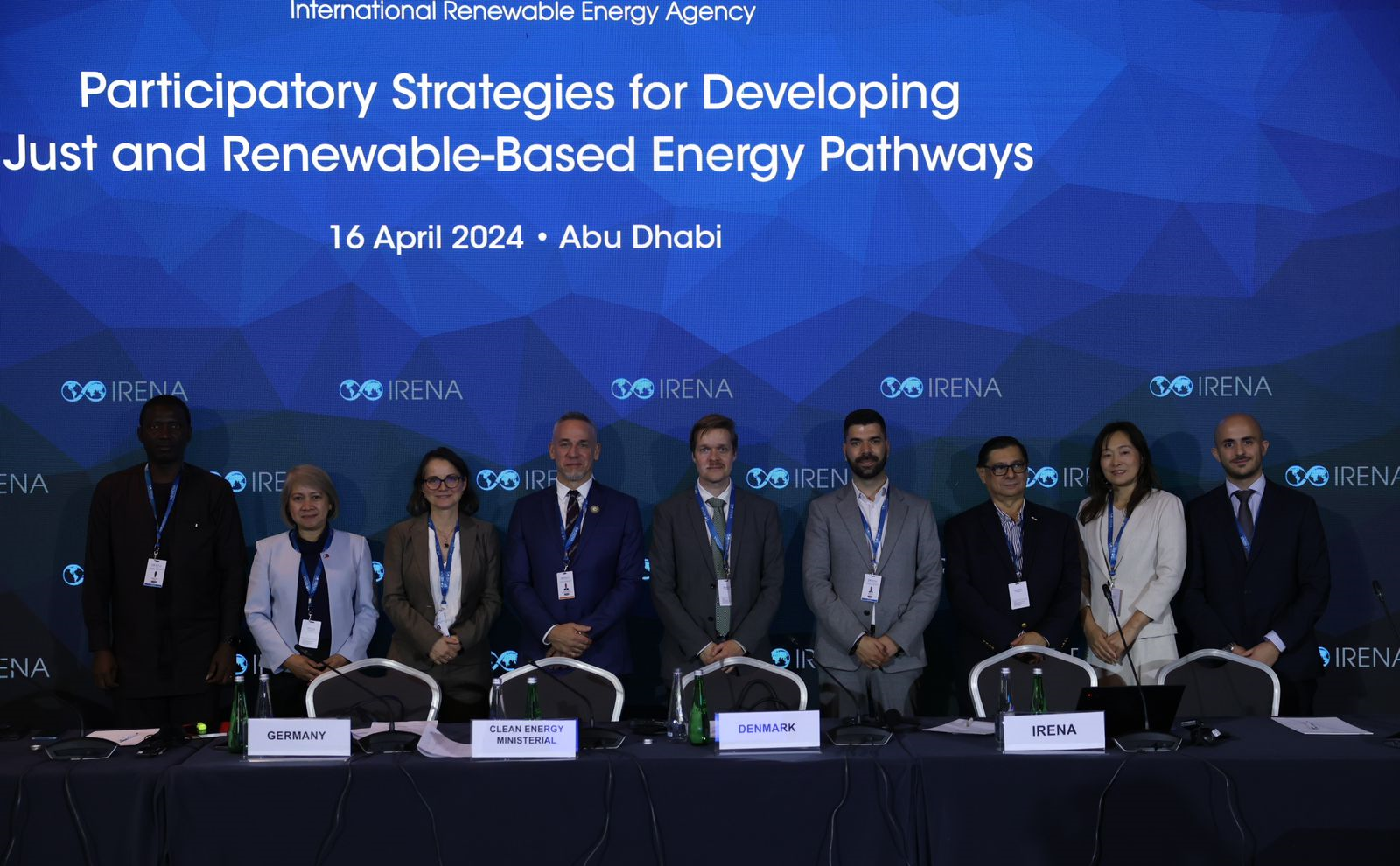
Bruno Sousa, Deputy Director for Energy, Directorate General of Energy and Geological Resources, Portugal underlined the importance of sharing knowledge and listening to others when planning energy transition strategies. "We have many investors but we don't have the grid connections. We need to plan, and so we need to listed to the stakeholders, to be able to go to the field," he said.
Fredrick Appiah, Energy Commission, Ghana underlined that Ghana appreciates all lessons learnt via participation in long-term energy planning initiative. The engagement with different sectors helps to institutionalise the national energy planning framework and get the buy in.
The session concluded with an agreement that a strong participatory process is the backbone for effective energy plans and scenarios that can gain acceptance and the trust of the public and stakeholders. Energy scenarios provide a vision for the future energy system and show how stakeholders from different sectors can play a part in its transformation.
High-Level Public-Private Dialogue "Building momentum towards a 100% Renewable energy system"
With the aim to foster multi-stakeholder engagement, this session builds on the achievements of COP28, encouraging global strides towards ambitious renewable energy goals and enhanced policy innovation. IRENA Director-General opened this high-level dialogue saying "The UAE Consensus gave a clear objective to pursue, but we are still far from where we should be".
In a scene-setting presentation, Raul Alfaro Pelico, Director of Knowledge, Policy and Finance, IRENA summarised the 100% renewable energy scenarios: Supporting ambitious policy targets report, highlighting the role the renewables beyond providing energy access. “It's crucial to note the positive socioeconomic and environmental impacts that renewable can have. Between 2 to 5.5 million premature deaths are caused by air pollution annually. Deploying more renewable energy would lead to health improvements, potentially saving millions of lives.”
|
H.E. Parviz Shahbazov, Minister of Energy, Azerbaijan has stated that the Consensus reached in the UAE agreement to triple renewables by 2030 is an important steps towards sustainable agenda. "Ensuring a safe and sustainable energy for all will also be conditional to implementing national commitments. As COP29 country, Azerbaijan is committed to act on climate goals and our renewable energy deployment will be doubled by the year 2027:, he concluded. |
“We can share our experience with the countries in need, particularly those in Latin America and the Caribbean countries,” said The Deputy Minister of Energy and Mines, H.E. Ms Tatiana Amaran Bogachova, Cuba, when speaking on the need for collaboration regarding the increased need for the deployment of renewable energy. She also highlighted Cuba’s efforts in the energy transition, particularly when it came to the advancements made in installed solar capacity.
“We just had the biggest energy policy reform in 2022 so half of our electricity over the half comes from renewables,” says Dr Heike Henn, Director for Climate, Energy and Environment at the German Federal Ministry for Economic Cooperation and Development, Germany. She also noted that a renewable energy transition takes time and requires clear targets and pathways to work. She also highlighted the need for a holistic approach, understanding the socio-economic impact that the energy transition to renewables has, “We need to train our workforce, which is a not-so-easy challenge for us. We need to ensure social acceptance through processes but also through appropriate schemes where we can support communities and move to greener energy."
IRENA World Energy Transitions Outlook presents a pathway to achieve the 1.5°C target by 2050, positioning electrification and efficiency as key transition drivers, enabled by renewable energy, clean hydrogen and sustainable biomass.
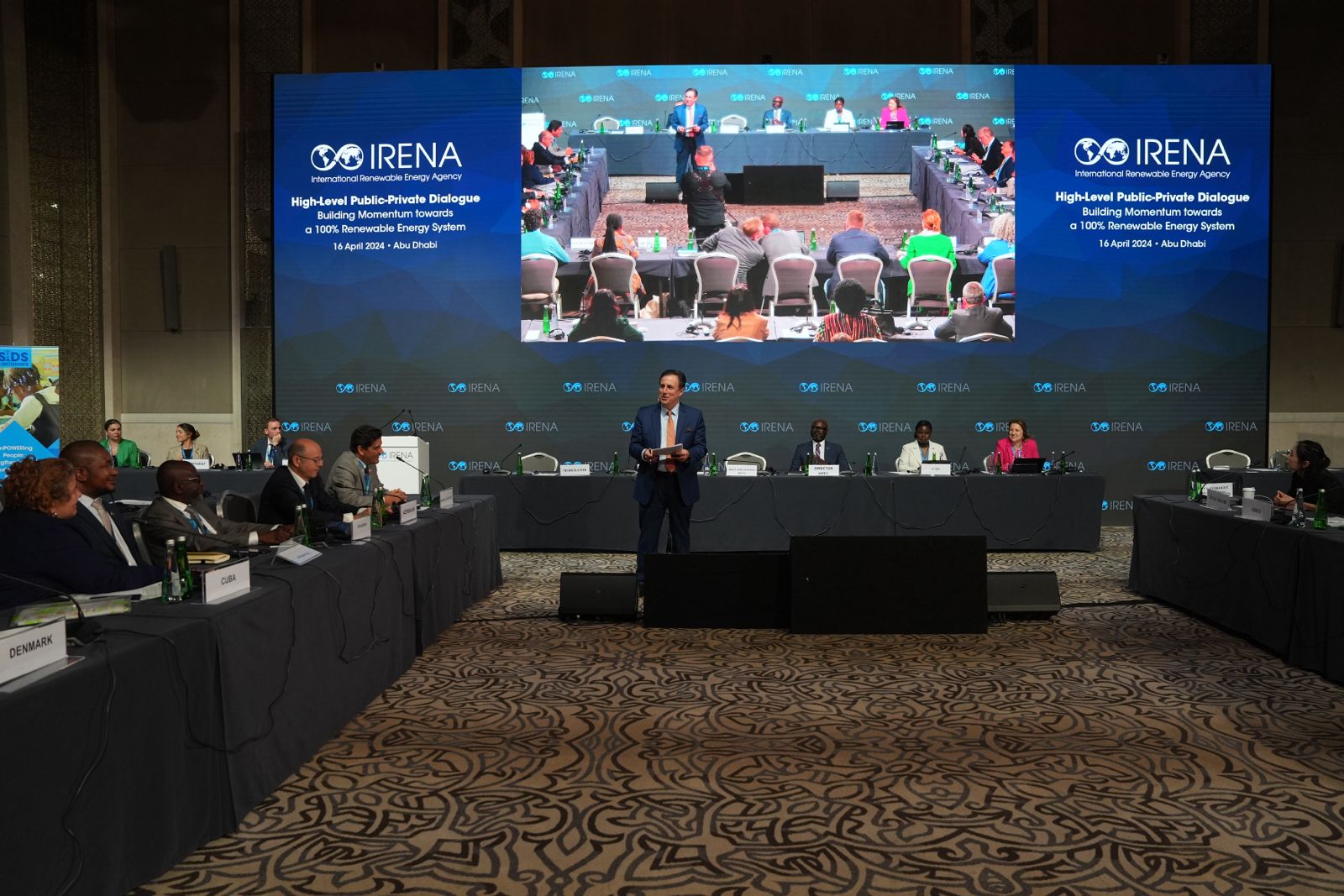
Scaling-up Sustainable Bio-based Energy and Fuels in Emerging Markets
In this session, the participants will discuss utilising sustainable biomass in emerging markets to foster sustainable circular bio-economies, showcasing advancements in bio-based cooking technologies and sustainable aviation fuels, and highlighting their impact on sustainable bio-economies.
The first panel of this session focuses on bioenergy use for clean cooking. Opening the discussion, Gerard Ostheimer from Biofuture presented a campaign on clean cooking that opens opportunities that connect governments and industries. Michela Morese, Senior Natural Resources Officer, FAO, emphasised how clean energy access is crucial for global communities. "Each year of cooking with solid fuels and kerosene costs the world trillions of USD in environmental and local economies damages. Based on our experience, the FAO recommends microgasification and biogas for example, as clean cooking solutions," she said.
Isaac Kiva, Secretary of Renewable Energy, Ministry of Energy, Kenya, explained how bioenergy meets 68% of the country's final energy demand, mainly for cooking and heating. Furthermore, the Kenyan government has set the goal for universal access to clean cooking by 2028 through among others the ongoing formulation of Kenya National Cooking Transition Strategy.
In the second part of the session, the panelists discussed the bio-based feedstock for sustainable aviation fuels, sharing technical expertise and exchanging knowledge on the topic. The session was concluded with panelists agreeing that biofuels have a role to fulfill in the world's fight against climate change. the takeaway from this session is straightforward – countries need to work together to scale up biofuels deployment and strengthen their roles in the tripling renewables capacity target.
Alliance for Industry Decarbonization (AFID)
Facilitated by IRENA, AFID unites private and public entities in energy-intensive sectors to expedite net-zero transitions in line with the Paris Agreement. The event aims to present a set of actions and joint initiatives for short and long-term plans. Opening the session, Gauri Singh, Deputy Director General of IRENA, said that decarbonising the industrial sector is crucial since industry is responsible for over 30% of global greenhouse gas emissions and nearly 40% of global energy consumption. “As demand for energy and industrial products rises, we must ensure emission reduction targets keep pace with limiting global temperature rise. Decarbonising industry represents a transformative opportunity, offering sustainable revenue streams and job creation for young people seeking to integrate sustainability into their careers. Realising this potential requires fundamental changes in markets and businesses, driven by leadership and commitment," she concluded.
Manoj Kumar Singh, CEO, Net Zero Think says that investors would readily engage in new energy transition ventures if the returns were well-defined. “Everyone is trying to look for returns but unfortunately it's all speculative. There is lack of clarity, which is hindering investments, because investors want to invest where returns are clear. We need to fast-track regulations and policies as the first step in laying the ground for enhancing investments in new transition technologies.”
In his closing remarks, David Frans, Senior Partner, Roland Berger, says that while the technology is in place and while ambition is steadily growing, “Governments need to be consistent in their policies for the transition to happen at the desired scale and speed.”
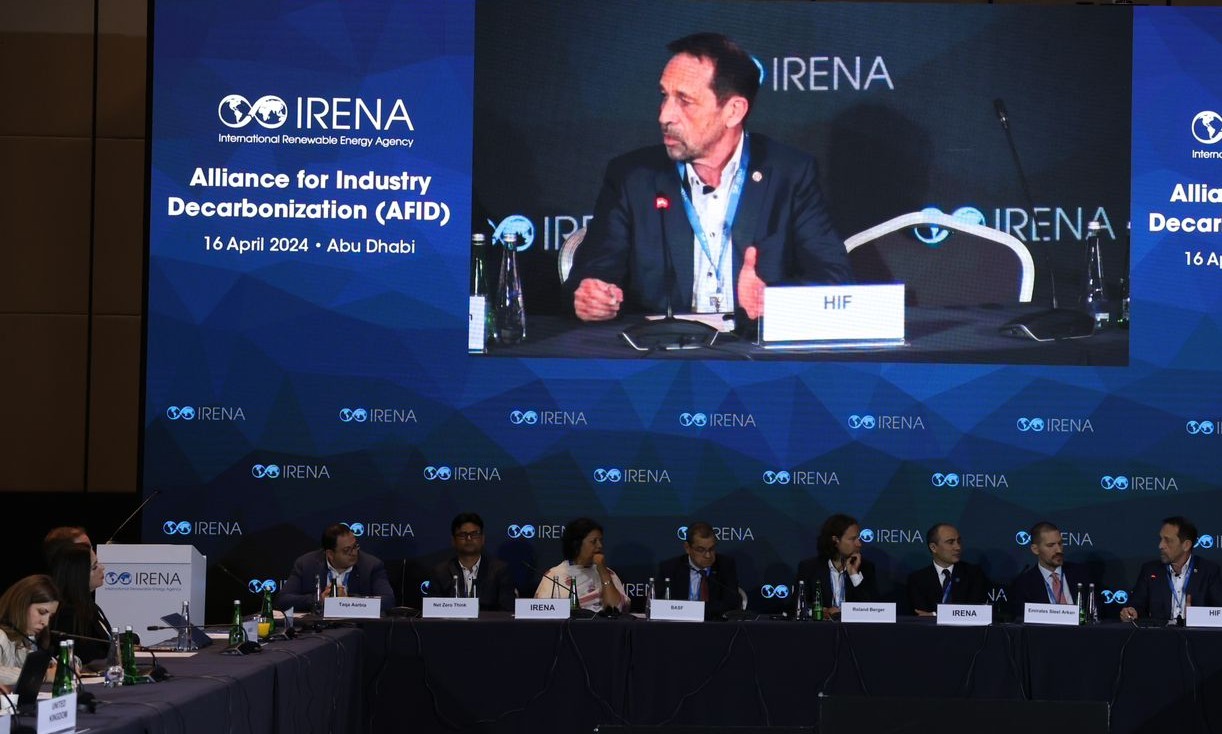
In summary, the key topics of this session included the necessity for robust financing mechanisms to support the tripling of renewable energy deployments, and the development of concrete business cases to secure essential funding. Further discussions also underscored the importance of regulatory clarity and global consistency in defining and maintaining the 'green' labelling of renewable projects as geographic discrepancies persist. Finally, the participants emphasized the critical role of collaborative platforms and policy frameworks, integrating advanced technologies, circular economy principles, and CO2 trading systems to drive forward industrial decarbonization effectively, and noted that the cost of inaction today could lead to significant economic and environmental challenges in the future, underscoring the urgent need to advance decarbonization efforts globally.







